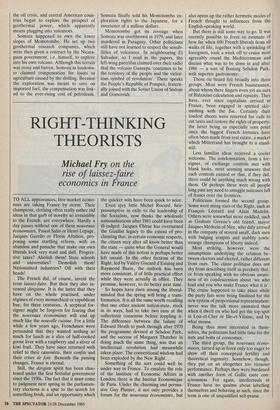RIGHT-THINKING THEORISTS
Michael Fry on the
rise of laissez-faire economics in France
TO ALL appearances, free-market econo- mics are taking France by storm. Their champions, clothing often really rather old ideas in that garb of novelty so irresistible to the French, are everywhere. Hardly a day passes without one of these nouveaux economistes, Pascal Salin or Henri Lepage, Jacques Garello or Florin Aftalion, pro- posing some startling reform, with an abandon and panache that make our own liberals look very staid and dull. Progres- sive taxes? Abolish them! State schools and universities? Demolish them! Nationalised industries? Off with their heads!
The French did, of course, invent the term laissez-faire. But then they also in- vented dirigisme. It is the latter that they have on the whole practised, under regimes of every monarchical or republican hue, for three centuries. A sceptical for- eigner might be forgiven for fearing that the nouveaux economistes will end up much like the nouvelle cuisine. For a little while a few years ago, Frenchmen were persuaded that they wanted nothing so much for lunch as a slice of half-cooked goose liver with a raspberry and a sliver of kiwi fruit. They have since returned with relief to their cassoulets, their confits and their crises de foie. Beneath the passing changes, France is eternal.
Still, the dirigiste spirit has been chas- tened under the first Socialist government since the 1930s. The fact that it must come to judgment next spring in the parliamen- tary elections is a spur to the search for something fresh, and an opportunity which the quicker wits have been quick to seize.
Even spry little Michel Rocard, heir- presumptive in exile to the leadership of the Socialists, now thinks the wholesale nationalisations after 1981 could have been ill-judged. Jacques Chirac has overturned the Gaullist legacy to the extent of pro- claiming that, in certain economic respects, the citizen may after all know better than the state — quite what the General would have made of this notion is perhaps better left unsaid. In the other factions of the Right, led by Valery Giscard d'Estaing and Raymond Barre, the outlook has been more consistent, if of little practical effect while they were actually in office. They promise, however, to do better next time.
So hopes have risen among the liberal- minded that the spring will bring a trans- formation. It is all the same worth recalling that one other ancient nation-state, stuck in its ways, had to take two runs at the collectivist consensus before toppling it. The difference between the failure of Edward Heath to push through after 1970 the programme devised at Selsdon Park, and the success of Margaret Thatcher in doing much the same thing, was that an intellectual revolution had meanwhile taken place. The conventional wisdom had been exploded by the New Right.
Something of the sort could well be under way in France. To emulate the role of the Institute of Economic Affairs in London there is the Institut Economique de Paris. Under the charming and persua- sive Guy Plunier, it not only provides a forum for the nouveaux economistes, but also opens up the rather hermetic modes of French thought to influences from the English-speaking world. But there is still some way to go. It was recently possible to form an estimate of how far when 600 French liberals from all walks of life, together with a sprinkling of foreigners, took a week off to cruise most agreeably round the Mediterranean and discuss what was to be done in and after 1986 — a sort of floating Selsdon Park, with superior gastronomy.
Those on board fell broadly into three groups. Most were French businessmen, about whom there lingers even yet an aura of Balzacian calculation and rapacity. They have, ever since capitalism arrived in France, been engaged in spirited skir- mishing with the fisc. Certainly their loudest cheers were reserved for calls to cut taxes and restore the rights of property: the latter being an especially sore point since the biggest French fortunes have often been made from real estate, a market which Mitterrand has brought to a stand- still.
Less familiar ideas received a cooler welcome. The condemnation, from a for- eigner, of exchange controls met with blank looks, most seeming unaware that such controls existed or that, if they did, there could be anything much wrong with them. Or perhaps these were all people long past any need to smuggle suitcases full of francs over the frontiers.
Politicians formed the second group. Some were rising stars of the Right, such as Francois Leotard and Alain Madelin. Others were somewhat more raddled, such as Graham Greene's old friend, mayor Jacques Medecin of Nice, who duly arrived in the company of several small, dark men with bulging armpits and stubbly jowls: strange champions of liberty indeed.
Most striking, however, were the assumptions underlying the relation be- tween electors and elected, rather different from ours. The classe politique does not shy from describing itself as precisely that, or from speaking with no obvious aware- ness of its condescension about 'we who lead and you who make France what it is'. The cruise happened to take place while the party lists were being finalised for the new system of proportional representation: never was the talk more animated than when it dwelt on who had got the top spot in Loir-et-Cher or Ille-et-Vilaine, and by what means.
Being thus most interested in them- selves, the politicians had little time for the nuts and bolts of economics.
The third group, the nouveaux econo- mistes, turned up in force only too eager to show off their conceptual fertility and theoretical ingenuity. Somehow, though, they put on an altogether too virtuoso performance. Perhaps they were burdened with another form of Gallic caste con- sciousness. For again, intellectuals in France have no qualms about labelling themselves and behaving as such, since the term is one of unqualified self-praise.


















































































 Previous page
Previous page